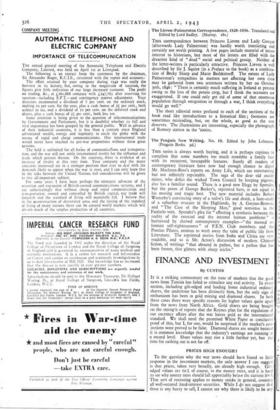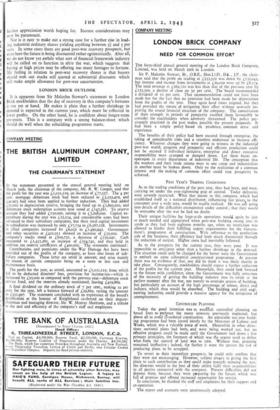FINANCE AND INVESTMENT
By CUSTOS
IT is a striking commentary on the state of markets that the good news from Tunisia has failed to stimulate any real activity. In every section, including gilt-edged and leading home industrial ordinary shares, the undertone has been distinctly firm, but the only sign of enthusiasm has been in gold mining and diamond shares. In both these cases there were specific reasons for higher values quite apart from the news from North Africa. Gold shares are being bought on the strenrh of reports that the Keynes plan for -the regulation of our currency affairs after the war leaves gold as the international standard. We shall need the promised White Paper as conclusive proof of this, but I, for one, would be surprised if the market's con- jections were proved to be false. Diamond shares are sought because it is common knowledge that the industry's earnings are running at a record level. Share values may rise a little further yet, but the time for cashing out is not far off.
PRICES HIGH ENOUGH ?
To the question why the war news should have found so little response in the investment markets, the only answer I can suggest is that prices, taken very broadly, are already high enough. Gilt- edged values are del, of course, to the money rates, and it is hard to see why money rates should fall appreciably below the current level. That sort of reasoning applies to money stocks in general, covering all well-secured fixed-interest securities. While I 4o not suggest that there is any hurry to sell, I cannot see why there is likely to be any further appreciation worth hoping for. Income considerations may now be paramount.
Nor is it easy to make out a strong case for a further rise in lead- ing industrial ordinary shares yielding anything between 31 and 5 per cent. In some cases there are good post-war recovery prospects, but even here the future is being discounted rather optimistically. After all, we do not know yet awhile what sort of financial framework industry will be called on to function in after the war, which-suggests that buying at high prices may be offering too many hostages to fortune. My feeling in relation to post-war recovery shares is that buyers should seek out stocks still quoted at substantial discounts which still make ample allowance for post-war uncertainties.
LONDON BRICK OUTLOOK It is apparent from Sir Malcolm Stewart's statement to London Brick stockholders that the day of recovery in this company's-fortunes is not yet at hand. He makes it plain that a further shrinkage in demand is expected in the current year, which must be reflected in lower profits. On the other hand, he is confident about longer-term prospects. This is a company with a strong balance-sheet which should do well when the rebuilding programme starts.



























 Previous page
Previous page